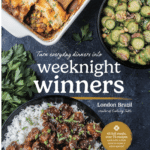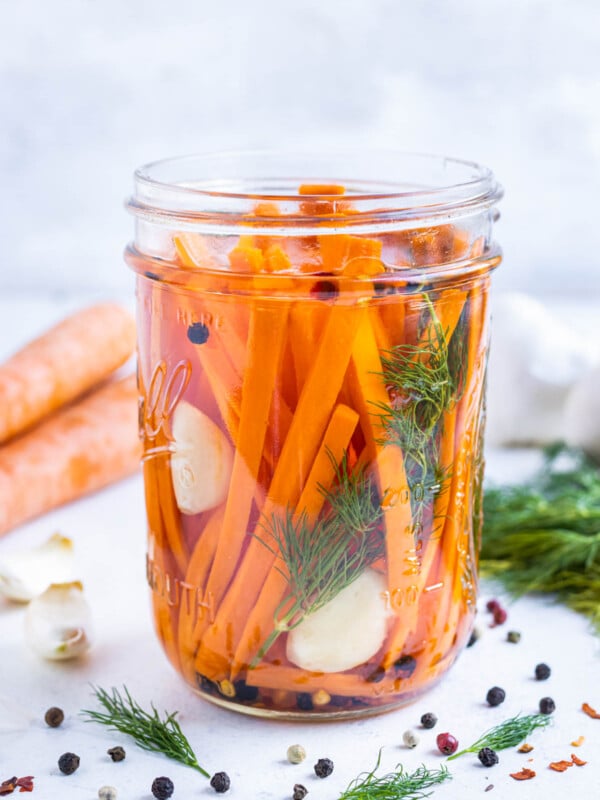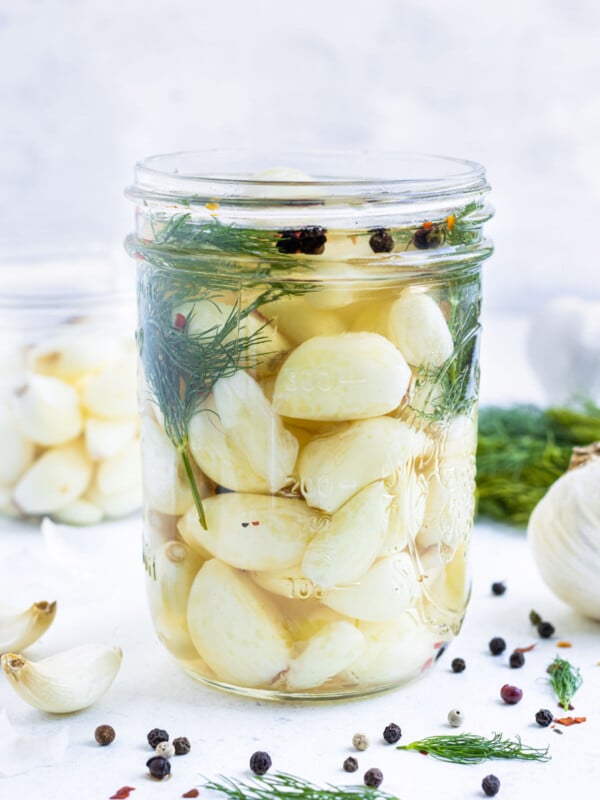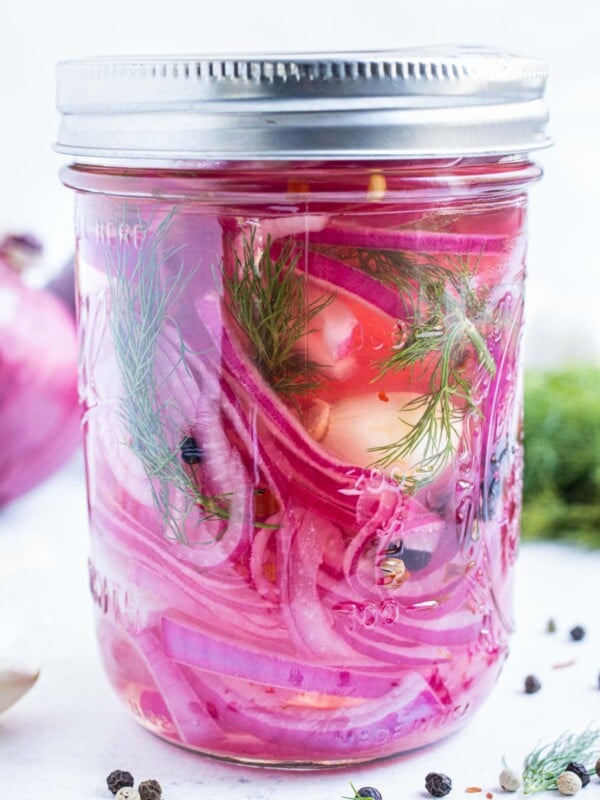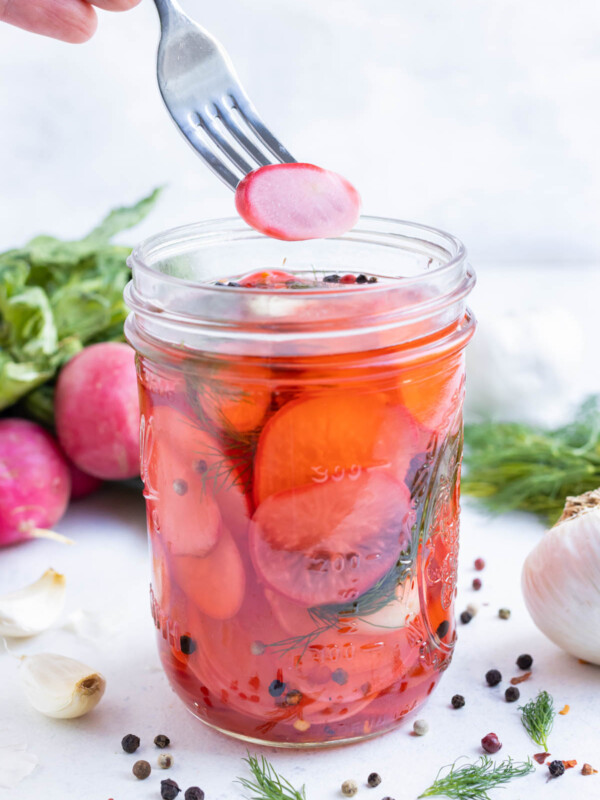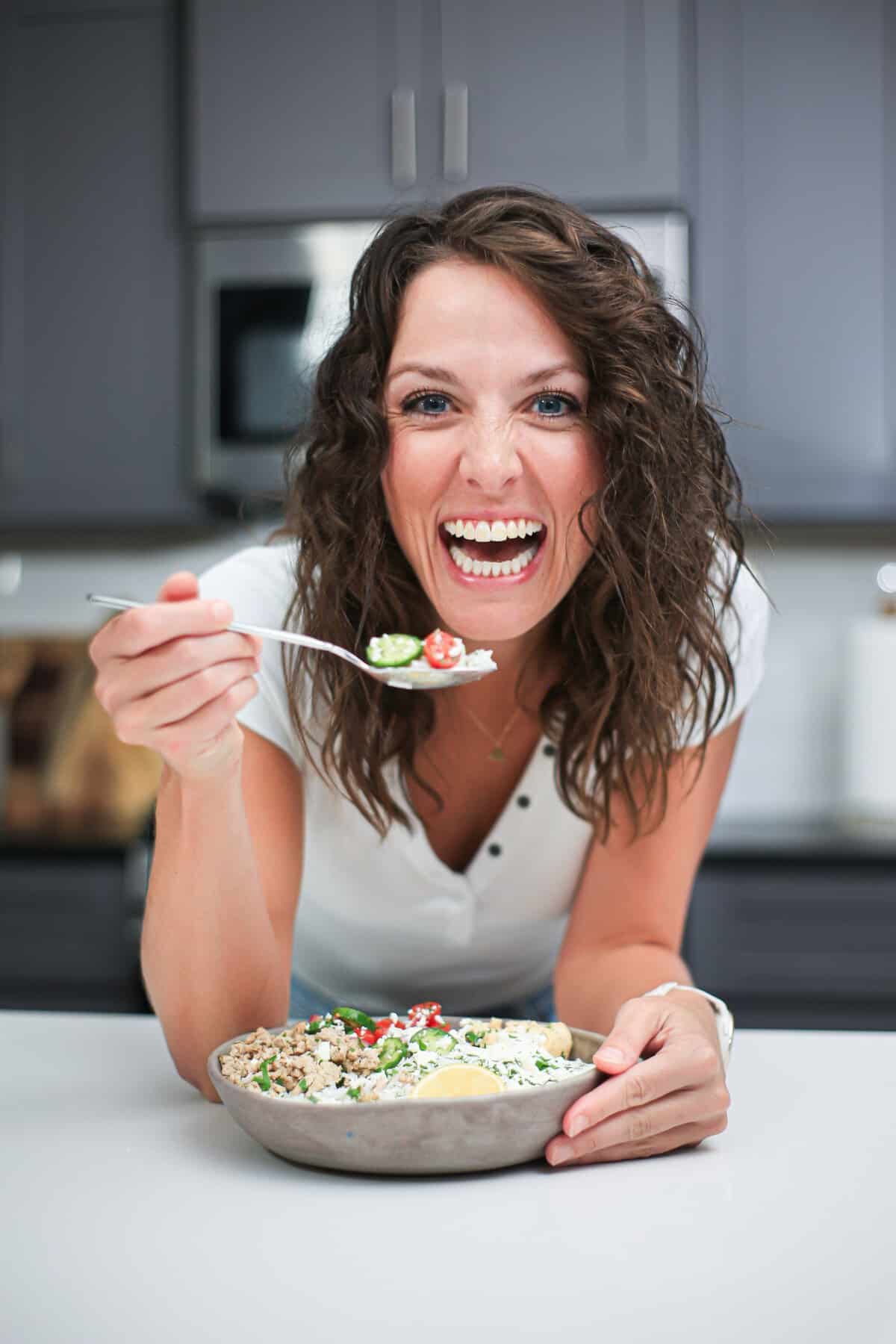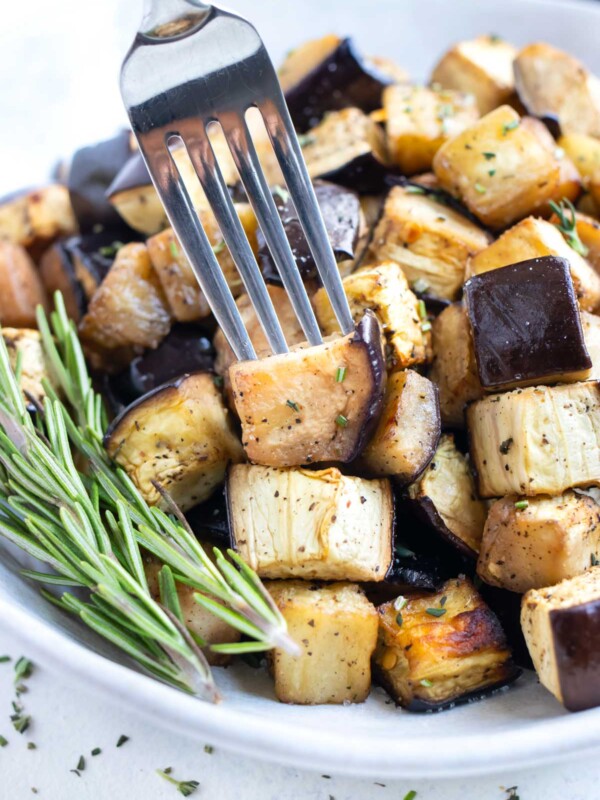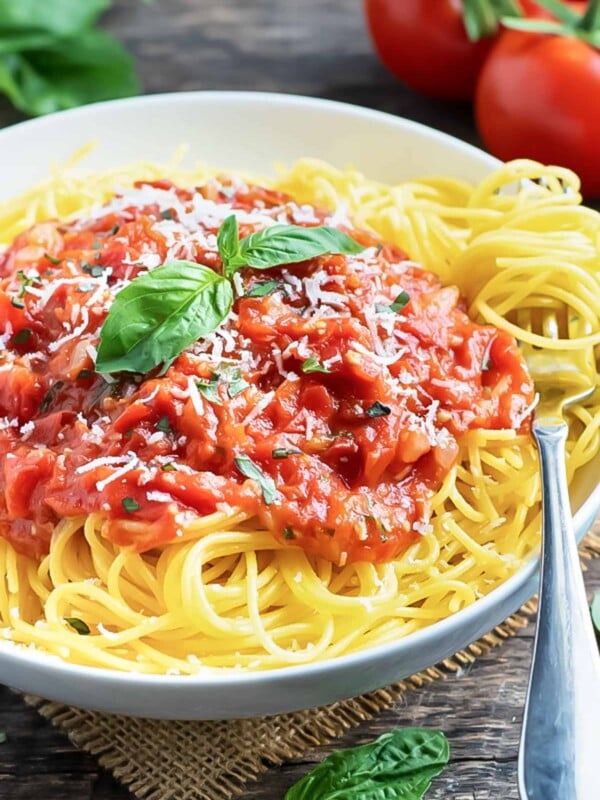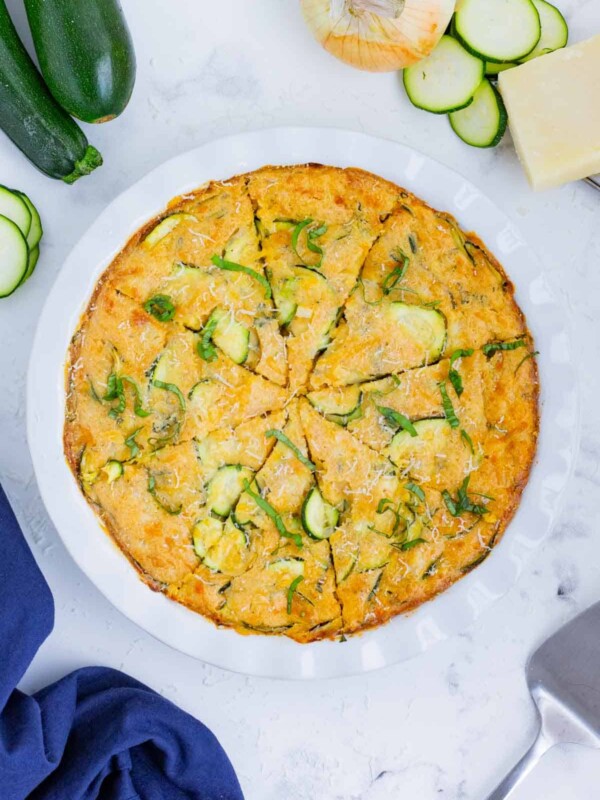Pickled carrots, ready overnight!

There’s this local spot with a rooftop patio overlooking downtown Austin that has the best duck tacos.
And tbh… it’s the quick pickled carrots on top that does it!
After these tacos and (and then shortly after, a delightful Korean beef bowl from a local restaurant!) I set to work transforming this Refrigerator Dill Pickles recipe into one that would work with carrots instead. It has my go-to brining solution that works with SO many veggies.
I took it up a level by including some garlic cloves, fresh dill, and whole peppercorns. The result was the BEST homemade pickled carrots that are ready to eat within 24 hours!
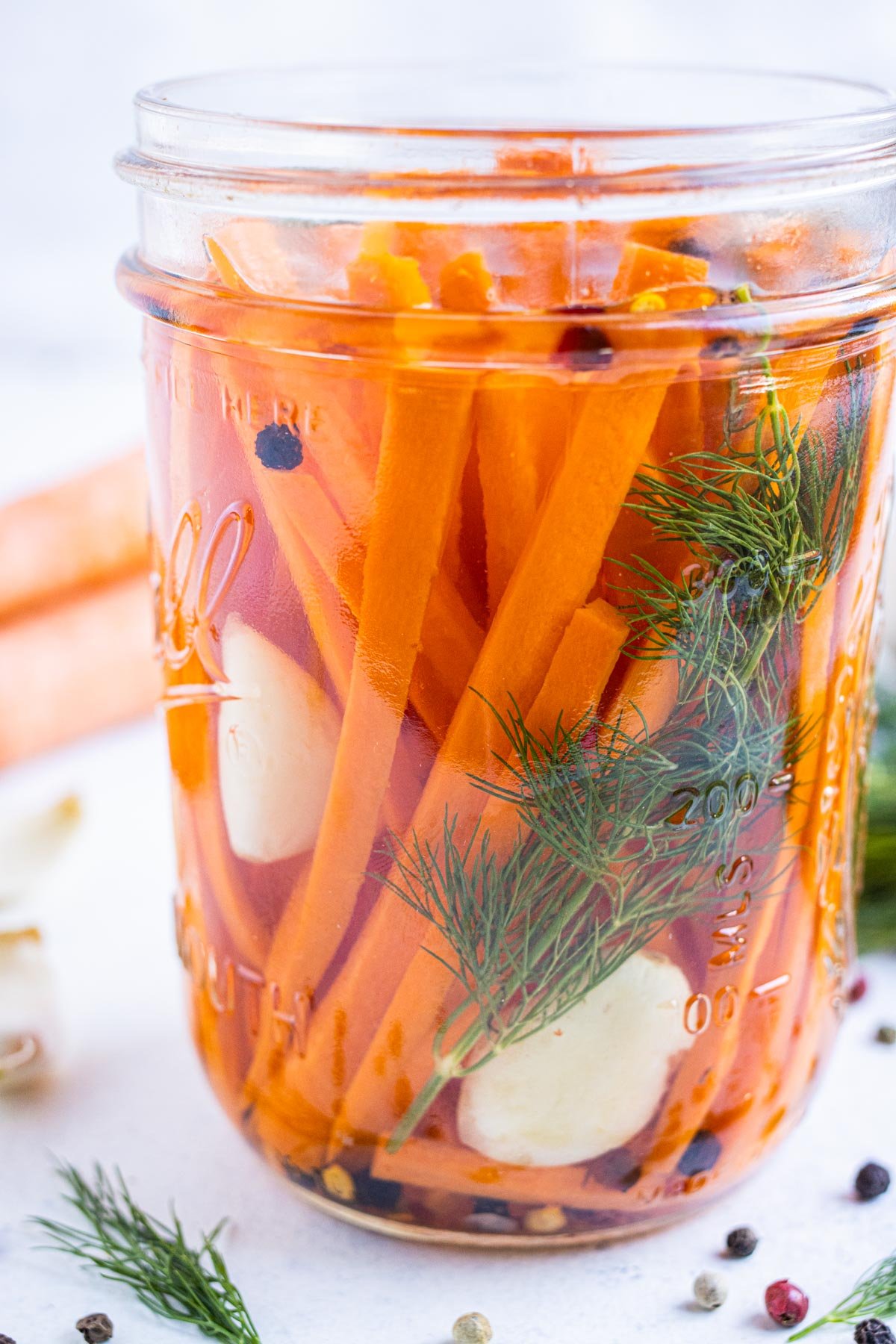
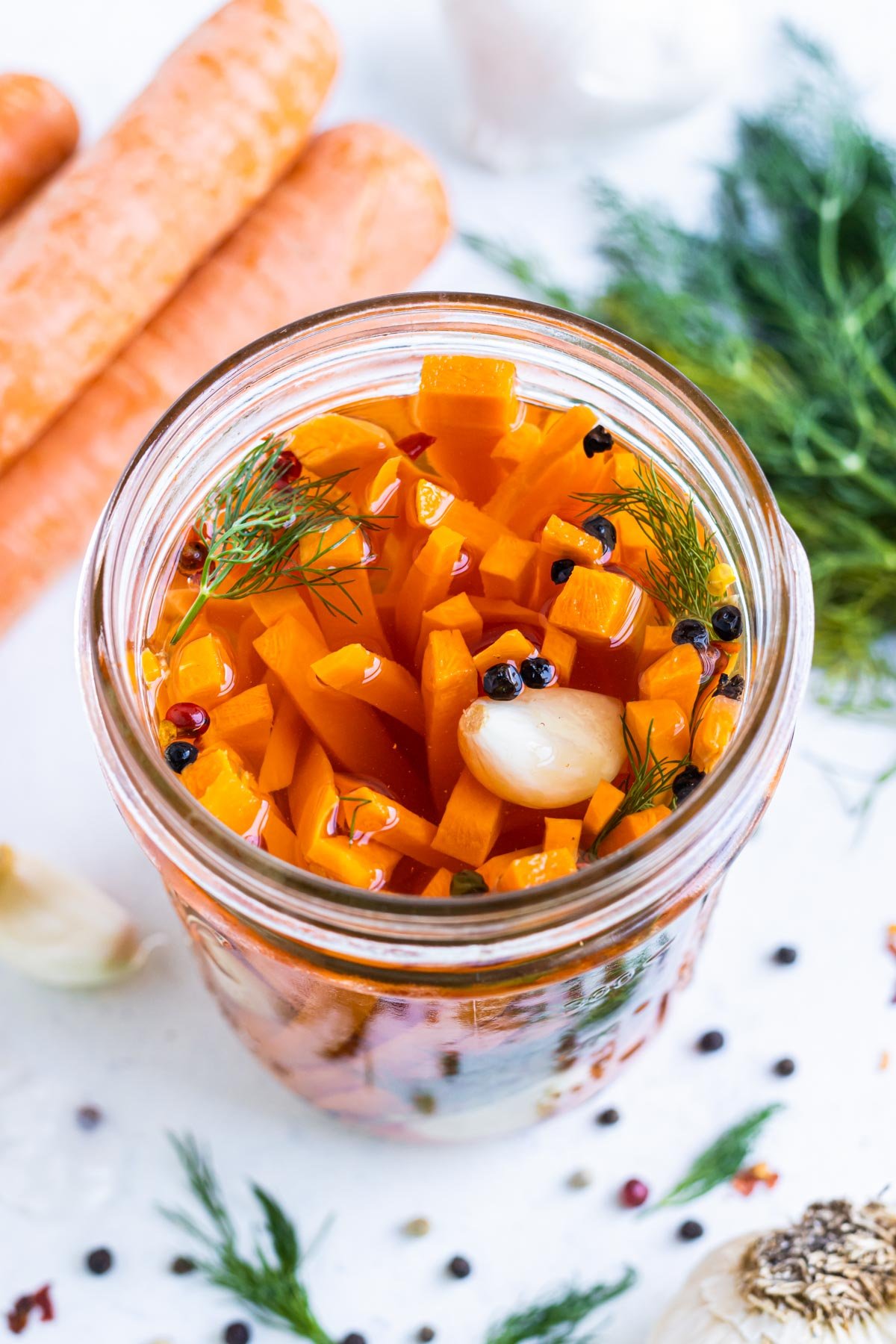
Ingredients and Substitutions
For the exact measurements and detailed instructions, please see the recipe card below.

- Carrots. You can either peel and then julienne cut them yourself, or buy a bag of matchstick carrots and save yourself time! If you decide to use baby carrots, you will need to steam them slightly to soften them up before pickling.
- Vinegar. To get the traditional pickle flavor, distilled white vinegar is a must. While you can use apple cider vinegar, the flavor won’t be quite the same. Rice vinegar and white wine vinegar won’t work well either.
- Water. Used to balance out the acidic flavor from the vinegar and keep the solution from being too sour.
- Salt. Any good brine requires salt! Pickling salt is best and should be readily available at most grocery stores. But table salt will do if that is all you have. You can always increase the amount, so start modestly.
- Sugar. You might want to add just a small amount to offset the tartness of the vinegar. You can use more or less depending on your preference.
- Optional Ingredients. There are so many things you can do here! Fresh dill, whole garlic cloves, black peppercorn, or pickling spice are all fantastic.
How to Make Pickled Carrots
Please see the recipe card below for more detailed ingredient amounts and the printable instructions.
Prep the carrots.
The easiest route? A bag of pre-cut matchstick carrots. They’re quick, convenient, and work great.
If slicing by hand, peel the carrots first, then julienne into thin, 4 to 4½-inch strips. Thinner slices soak up more brine and pickle faster.
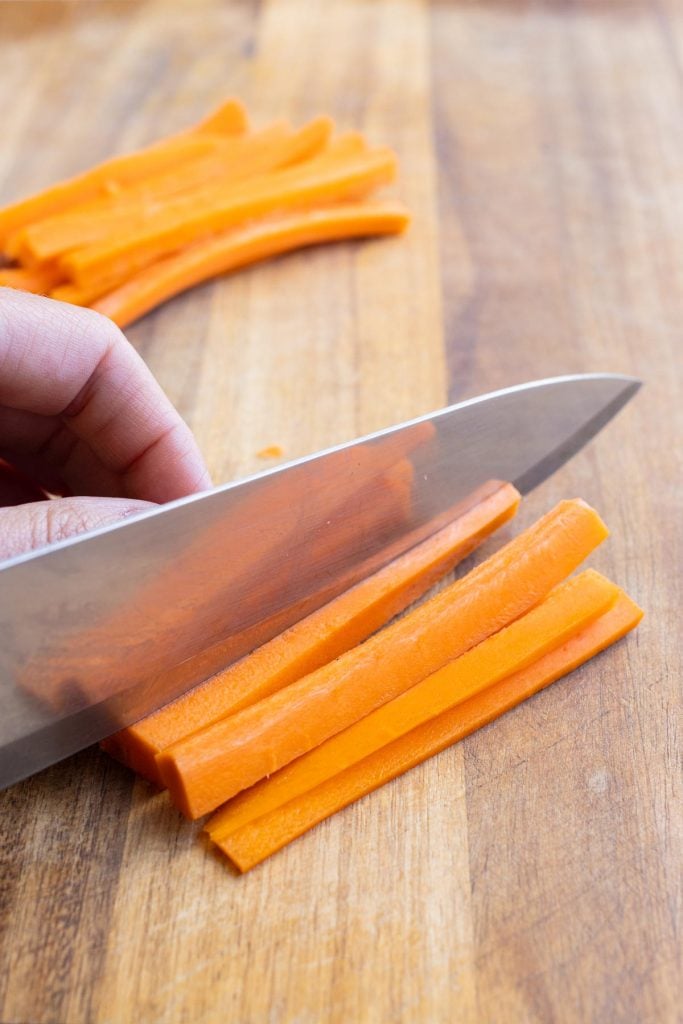
Make the pickling brine.
Combine vinegar, salt, sugar, and water in a medium saucepan. Bring to a boil, then reduce to a simmer for 2 to 3 minutes—just enough to dissolve the sugar and salt.
Avoid over-simmering so you don’t lose too much liquid. Set aside to cool slightly.
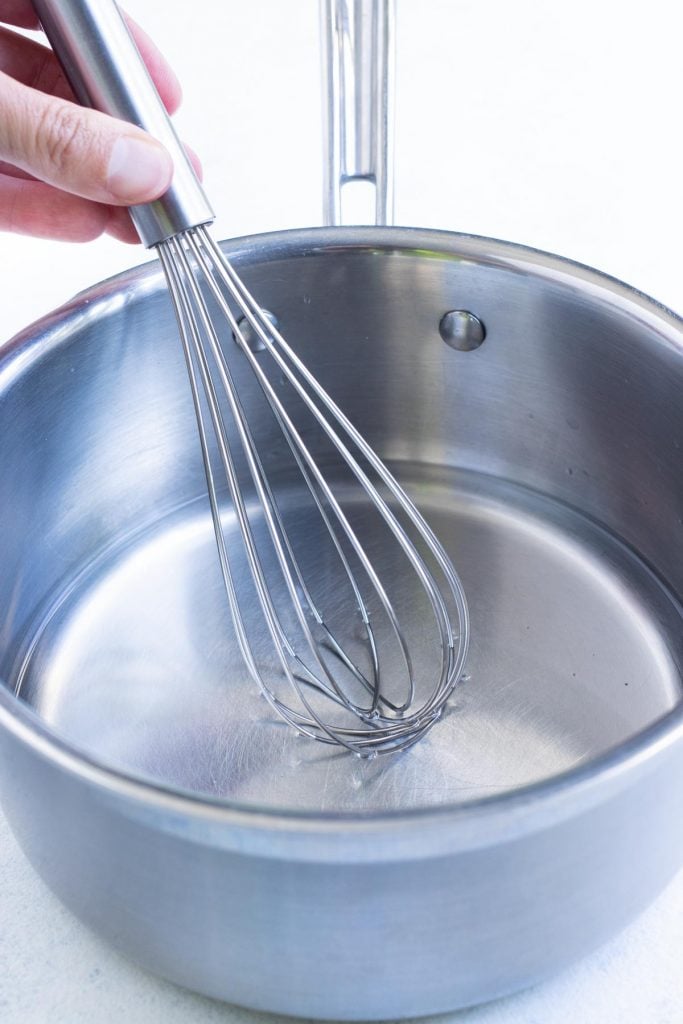
Fill up the jars, cover, and store!
Add flavor boosters like garlic, peppercorns, dill, or pickling spice to the mason jar first.
Pack in the carrots loosely, then pour in the warm brine. If needed, top off with a little water to fully submerge everything. Wipe the rim, seal the lid, and refrigerate.
They’ll be ready in about 4 hours, but even better the next day!
Pro Tip: Make sure the carrots stay completely submerged to help them keep longer.
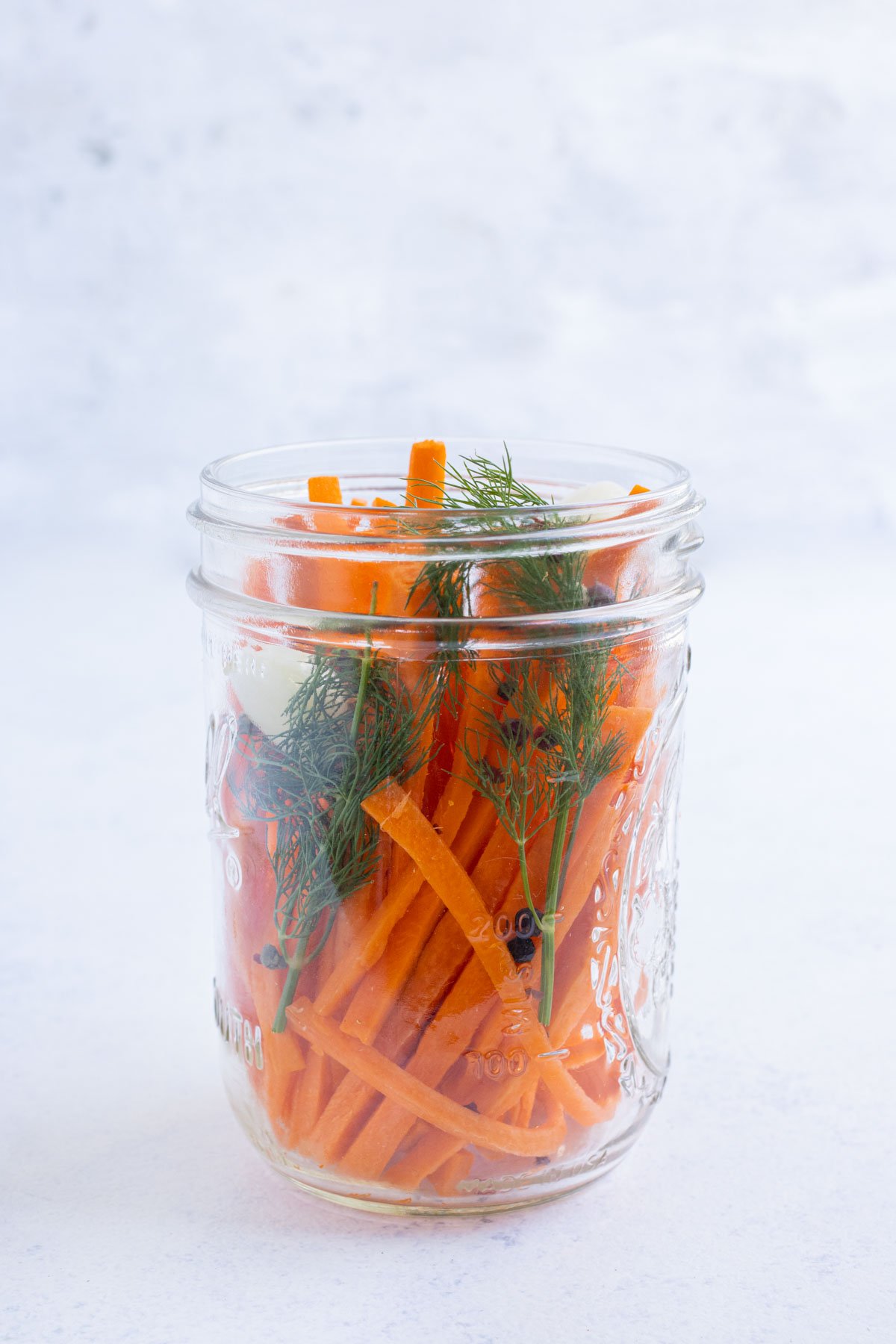
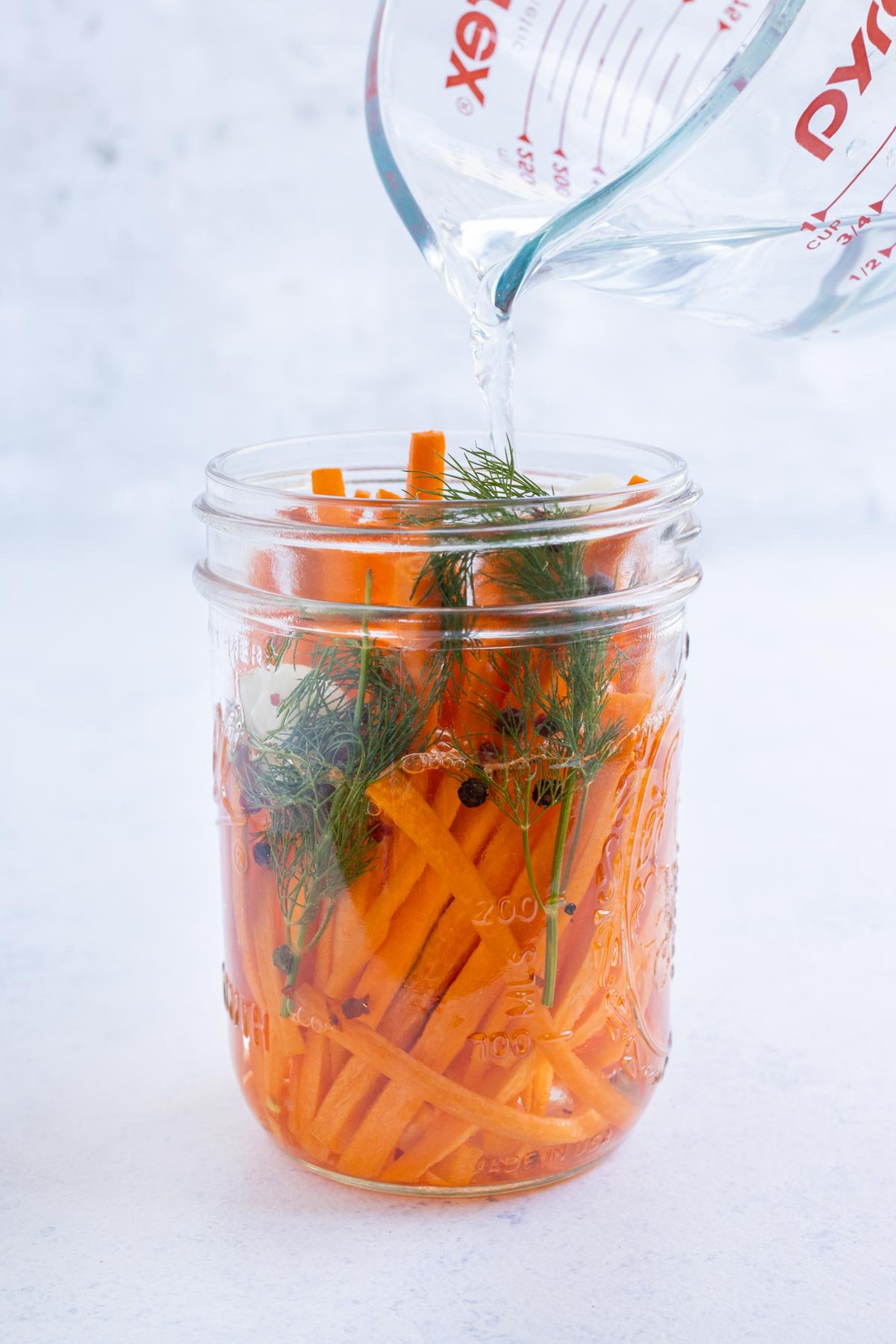
How long do quick pickled carrots last?
Quick pickled carrots will keep for up to 3 weeks in the fridge when stored properly in an airtight container and fully submerged in the brine.
How to tell if they’ve gone bad:
- Smell: If they smell sour in a weird way, funky, or just off, it’s best to toss them.
- Texture: Pickled carrots should stay crisp with a bit of bite. If they’re mushy or slimy, they’ve likely gone bad.
- Color: Some fading over time is normal, but if you see mold or anything unusual, they’ve gotta’ go.
- Mold or cloudiness: A little cloudiness is fine, especially if using spices. But visible mold or fuzz, an absolute no-go.
Pro Tip: Always use a clean utensil to grab what you need and make sure the carrots stay fully submerged in the liquid—this helps extend their fridge life.
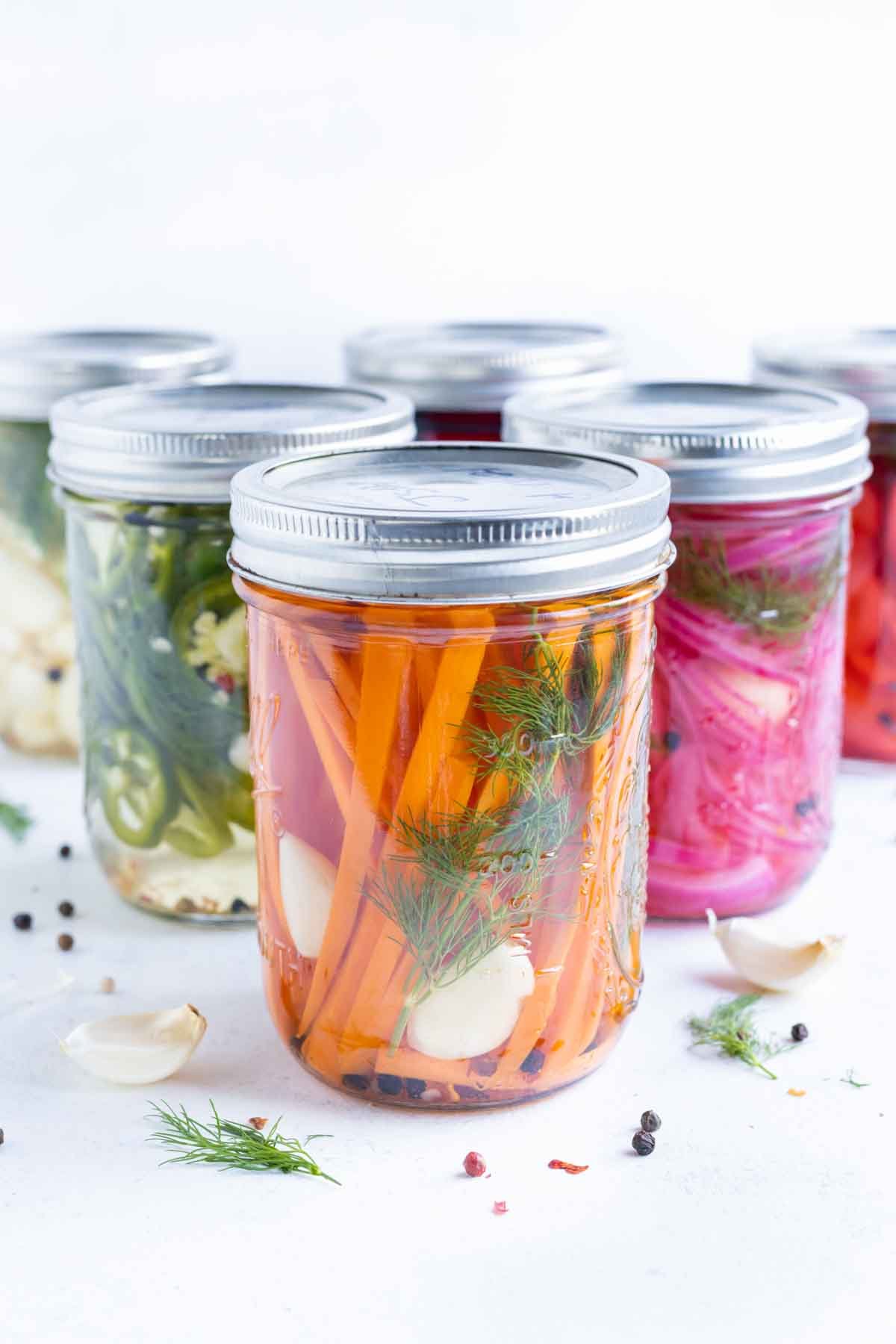
FAQs
Yes! White vinegar is classic, but apple cider vinegar or rice vinegar also work well. Just avoid anything too sweet or flavored unless you’re after a very specific taste.
You don’t have to, but gently heating it helps dissolve the salt and sugar quickly and allows the flavors to infuse better.
You can, but they’ll take much longer to soak up the brine. Thin slices or matchsticks are best for quick pickling.
Technically yes—for a second quick batch—but the flavor will be milder and the acidity might be reduced. Always refrigerate used brine and don’t reuse it more than once.
Tap stars to rate!
Quick Pickled Carrots Recipe
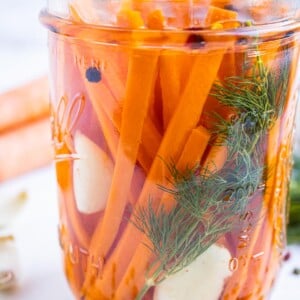
email this recipe!
Ingredients
- ½ pound matchstick carrots or whole cut into ¼-inch thick slices, 4 ½ inches long
- ⅔ cup distilled white vinegar
- ⅓ cup water
- 1 ¼ teaspoons salt
- 1 tablespoon sugar
- 3 fresh dill sprigs optional
- Pickling spice, red pepper flakes, or garlic cloves optional
Instructions
- Add vinegar, water, salt, and sugar to a saucepan over high heat. Bring to a boil and then reduce heat to low. Simmer for 2-3 minutes, whisking occasionally, or until the salt and sugar have dissolved.⅔ cup distilled white vinegar, ⅓ cup water, 1 ¼ teaspoons salt, 1 tablespoon sugar
- Add the carrots to a 16-oz. mason jar along with pickling spice, red pepper flakes, garlic, and/or dill, if using.½ pound matchstick carrots, Pickling spice, red pepper flakes, or garlic cloves, 3 fresh dill sprigs
- Pour the warm solution over the carrots and let cool to room temperature. If there is any space left in the jar, pour additional water in until it just reaches the top.
- Cover the jar with a lid and store in the refrigerator for at least 4 hours or up to overnight before enjoying.
Tap stars to rate!
Video
Notes
- Safety note: This is a quick pickling recipe, not a canning method. The carrots must be stored in the fridge and are not shelf-stable. Do not attempt to store at room temperature.
- Carrots: Matchstick carrots are a super quick and easy way to make this recipe! You can also julienne cut them if you have whole or baby carrots.
- Prep-Ahead: This recipe is best made ahead of time! You can make these carrots at least four hours or up to several days in advance.
- Storage: The carrots will last in the refrigerator in an airtight jar for up to 2 to 3 weeks.
Nutrition
Nutrition information is automatically calculated, so should only be used as an approximation.
Ways to Use Pickled Carrots
Pickled Carrots add a delicious twist to so many dishes that call for raw ones. Try them on any of these first:
More Quick Pickled Vegetable Recipes
It is so easy to make pickled vegetables, give any of these a shot next:
Quick Pickled Garlic
10 mins
Quick Pickled Beets
55 mins
Quick Pickled Red Onions
10 mins
Quick Pickled Radishes
10 mins
